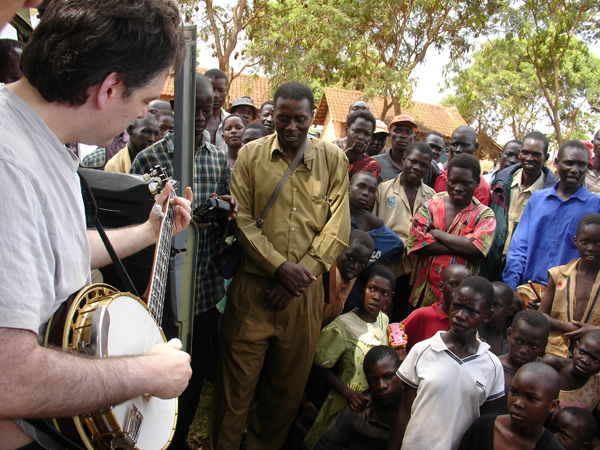|
Reviews of Recent Independent, Foreign, & Documentary Films in Theaters and DVD/Home Video

THROW DOWN YOUR HEART Throw Down Your Heart is an extended “making of” documentary for banjo virtuoso Béla Fleck’s final recording project in his “Tales from the Acoustic Planet” music trilogy. Volume one brought together jazz and bluegrass players; volume two, different generations of bluegrass musicians. Volume three will further confound stores in how to categorize the New York-born, Nashville-based Fleck’s stereotype-smashing banjo music. He has already been nominated 25 times for Grammys in more categories than any other musician. He expands his acoustic collaborations to Africa, where the banjo was born and brought to the New World with slaves. His adventure is a mix of the seemingly spontaneous, in the villages of East Africa, and the planned, with urban musicians in West Africa. In Uganda, folklorist Haruna Walusimbi guides open air auditions near the banks of the Nile. It literally takes a village to make music when the community comes together to play and accompany a 15-plus foot long, engraved marimba (a large version of wooden xylophones). Alan Lomax-like, Fleck and his crew realize that the colorfully dressed women who are so generously making their meals are singing beautifully, and he records their welcome song right in their cooking hut. As glorious as the music is, it does seem contrived that the filmmakers just happen to stumble across the rare female thumb piano musician (and exuberant singer) Ruth Akello. As the crew moves west to Gambia, they hear more stories of the slave trade. (The title is the translation of Tanzanian name for the former slave port Bagamoyo, named so by captives when they realized they would never return home). Fleck then concentrates more on seeking out other stringed instruments thought to be the progenitor of the banjo. Africa-experienced cinematographer Kirsten Johnson (Pray the Devil Back to Hell and Darfur Now) is adept at picking up contrasting details (Fleck camping with a makeshift shower in a rustic village), in addition to the usual footage of irresistibly adorable and photogenic children. In Mali, they are guests of superstar singer Oumou Sangare at her luxury tourist hotel. Followed everywhere by adoring fans and her security detail, she commands noted musicians to come to Bamako for studio sessions. (Fleck accompanies her on two of her own gorgeous compositions, one as a duo and the other surrounded by African instruments.) The film’s other collaborations range from jamming on traditional tunes to co-/writing new pieces, with individuals and family bands. Director Sascha Paladino (Fleck’s younger brother) well captures Fleck’s process as an intense, respectful listener and a quick learner who transcribes the music just from a few hearings and adapts to new rhythms, even blending in bluegrass. Fleck is
more interested in making music than tracing the history of the banjo.
But it is frustrating that the comparisons between fingering and picking
techniques are barely glimpsed in this casual guided tour
of African music, and he doesn’t mention other American plucking styles
that may relate to their African roots. Instead, as
Sangare
laughingly notes, Fleck speaks more with his fingers than in
conversation, and the pure musician-to-musician communications joyfully
cross language barriers and instrument differences.
Nora Lee Mandel
|

